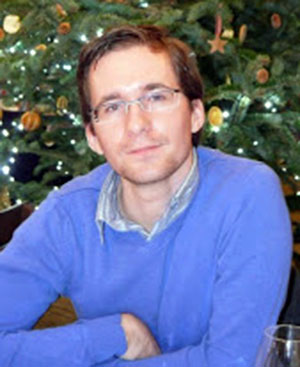David Stillwell, 28, Psychometrics
“My decision-making research taught me that we humans don’t have any idea why we do most of the things we do,” says David Stillwell, the research manager of Cambridge’s Psychometrics Centre. “We just make up explanations after the fact.”
To try to understand people better, Stillwell devised a Facebook app called You Are What You Like, a personality assessment that doesn’t ask you any questions. Instead, it uses your Facebook likes to determine things like how liberal or conservative you are, how conscientious or spontaneous, how shy or outgoing, even how neurotic. The app created a broad database of Facebook behavior, which Stillwell has made available to fellow academics.
(Photo: David Stillwell)

“I showed that Facebook Likes can predict personality, IQ, ethnicity, addictive substance use, and other traits that people would assume are private,” he says.
Another of Stillwell’s Facebook apps, called MyPersonality, let people take a psychological test and get feedback on their results. The data collected is now cataloged in a wiki, and being used in scientific research. “More than six million people were able to take the test,” Stillwell says, “and see that personality tests aren’t all about ‘What Star Wars character are you most like?’”
The main question Stillwell asks is: What can we learn from people’s digital behavior? “We are on the cusp of a revolution in psychology research because of the switch to digitally mediated interaction,” he says. “Ten years ago, to find out who someone’s friends were would involve participants trying to remember the hundreds of people they talk to. Now they can just share their Facebook friendships in a single click. This digital trail of information is only going to become richer as new technologies like Google Glass become widespread.”
Stillwell intends to devote his career to using what he calls “Big Digital Data” to survey how people act. He hopes to be able to figure out things like where people are happiest living, and whether we can observe changes that predict schizophrenia years before it’s diagnosed.
He decided on psychology because he was a fan of economics. “Economists make beautiful mathematical models of how people will behave,” Stillwell says, “but they’re psychologically simplistic.” Stillwell wrote his Ph.D. about how people make decisions in situations in which they lack self-control—a common realm where actual behavior doesn’t match economists’ models.
Stillwell sees psychology as a hard science. More than theories and principles, he says, “the fundamentals of practical psychology research are statistics and computer programming. Can you program your own experiment to run on Amazon’s Mechanical Turk? Can you work with the massive dataset that comes out of an MRI machine?”
He also sees young academics—himself included—as entrepreneurs: “They do risky projects that no one else has tried before, they have a limited amount of capital with which to do them, they never stop thinking about their work, and if they’re successful, the rewards are theirs alone rather than shared among a large corporation.”
Still, one frustration he has with academic research is that scholars can spend a year on producing a finding that maybe 10 people will end up reading. The fact that his Facebook studies have gotten so much attention—stories about them made the front page of Google News, BBC’s “most shared” spot, and a Conan O’Brien joke—gratifies him. “It feels more valuable when a wider audience is interested in your work,” he says.
Even when he’s not working, Stillwell spends a lot of time using the sites he researches. “My work would quickly become out of touch if I didn’t enjoy using social media myself,” he says. “And it’s a good excuse for why I’m on Facebook in the office.”
See our complete 2014 list of the 30 top thinkers under 30 here.





